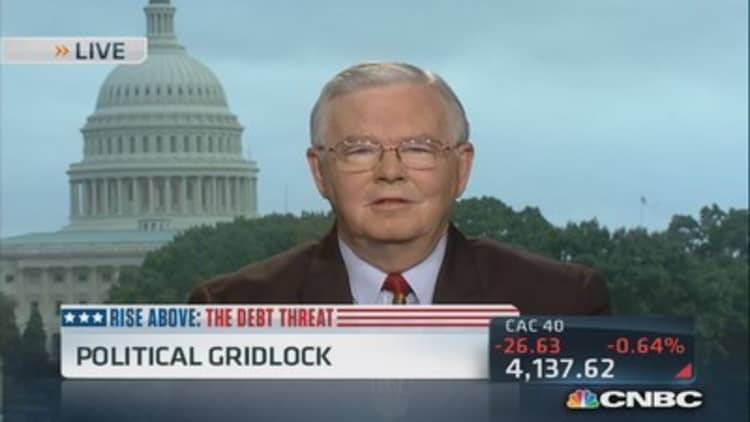With no real progress made on the shutdown over the weekend, stocks ended mostly down in Asia, weaker in Europe while U.S. markets opened in the red,
House Speaker John Boehner, speaking on ABC, specifically said he did not have the votes for a "clean" continuing resolution (CR) or debt ceiling bill and even hinted we were on the path to default.
Does Boehner really not have the votes for a "clean" CR bill? ABC News says 21 House Republicans are willing to support a government funding bill with no conditions attached. That would seem to be enough, assuming all Democrats would vote for it.

The economic relevance of the shutdown has also been greatly mitigated. The Pentagon has called back most of their workers. Meanwhile, Congress has agreed to provide back pay to everyone who has been furloughed. United Technologies' Sikorsky Aircraft unit canceled temporary layoffs that had been scheduled to go into effect today.
That changes the economic dynamics.
What cover can moderate Republicans be given? Maybe a dramatic drop in the market as we approach the debt ceiling extension.
Meantime, stocks will continue to move sideways at best and slowly grind lower. It's good news, since we are accomplishing the consolidation that a lot of people wanted to see. If you're a value guy, you like seeing what you're seeing: Stocks are cheaper.
And what about the downside? What happens if we go past October 17? Markets will certainly move lower, and the downside would likely be another five percent.
Of course, if a deal is announced, we will likely get a rally, maybe two percent. Then fundamentals will take over.
Much has been made that the 10-year yield, rock-steady at 2.6 percent, is telegraphing that there will be no default and bondholders will be paid. They got support this morning when the CEO of Moody's went on CNBC to state that even if we went past the October 17th deadline, the U.S. was unlikely to default. That is because Moody's believes bondholders would still get paid, that the U.S. would prioritize its debt payments.
One thing's for sure: if we go to October 17th, expect the 10-year yield to move toward 2.5 percent or lower, from the 2.6 percent today.
Elsewhere
1) earnings season starts: Alcoa tomorrow night, but more importantly bank earnings season starts Friday with JPMorgan and Wells Fargo. Sentiment is fairly negative on the banks, as there have been reports that trading activity has been weak, and that mortgage activity has been down. Some large banks like JPM and Bank of America are also likely to have much higher legal reserves.
2) Housing-related stocks slide pre-market after Goldman Sachs downgrades luxury homebuilder Toll Brothers, saying it is unnecessary to be concentrated at the high-end of the market as the recovery spreads. Pulte Group, Masco (MAS), and DR Horton fall in sympathy. In the same note, Goldman upgraded real estate brokerage company Realogy, stating concerns that resulted in the firm's under-performance have largely diminished. RLGY went public a year ago amid the run-up in the housing market.
3) Don't miss my exclusive interview with SEC Commissioner Dan Gallagher on Squawk on the Street at 11:40 AM this morning. We'll talk about high frequency trading, and whether investors are getting a fair shake in the markets. Is investing in stocks really a casino?
—By CNBC's Bob Pisani



